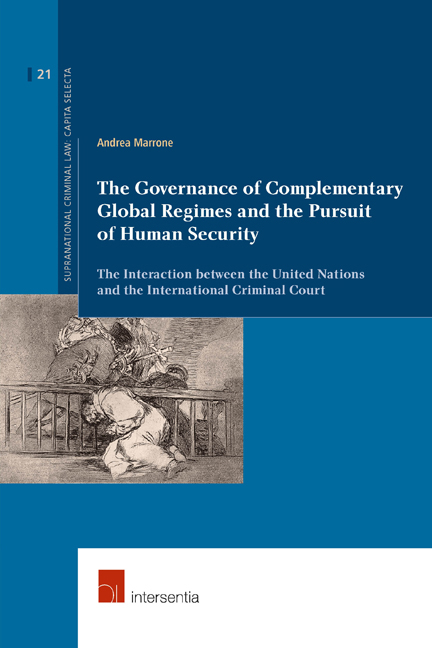 The Governance of Complementary Global Regimes and the Pursuit of Human Security
The Governance of Complementary Global Regimes and the Pursuit of Human Security Published online by Cambridge University Press: 15 December 2017
PRIMARY LAW
The Charter of the United Nations – Excerpts
The Charter of the United Nations was signed on 26 June 1945, in San Francisco, at the conclusion of the United Nations Conference on International Organization, and came into force on 24 October 1945. The Statute of the International Court of Justice is an integral part of the Charter.
Amendments to Articles 23, 27 and 61 of the Charter were adopted by the General Assembly on 17 December 1963 and came into force on 31 August 1965. A further amendment to Article 61 was adopted by the General Assembly on 20 December 1971, and came into force on 24 September 1973. An amendment to Article 109, adopted by the General Assembly on 20 December 1965, came into force on 12 June 1968.
The amendment to Article 23 enlarges the membership of the Security Council from eleven to fifteen. The amended Article 27 provides that decisions of the Security Council on procedural matters shall be made by an affirmative vote of nine members (formerly seven) and on all other matters by an affirmative vote of nine members (formerly seven), including the concurring votes of the five permanent members of the Security Council.
The amendment to Article 61, which entered into force on 31 August 1965, enlarged the membership of the Economic and Social Council from eighteen to twenty-seven. The subsequent amendment to that Article, which entered into force on 24 September 1973, further increased the membership of the Council from twenty-seven to fifty-four.
The amendment to Article 109, which relates to the first paragraph of that Article, provides that a General Conference of Member States for the purpose of reviewing the Charter may be held at a date and place to be fixed by a two-thirds vote of the members of the General Assembly and by a vote of any nine members (formerly seven) of the Security Council. Paragraph 3 of Article 109, which deals with the consideration of a possible review conference during the tenth regular session of the General Assembly, has been retained in its original form in its reference to a “vote, of any seven members of the Security Council”, the paragraph having been acted upon in 1955 by the General Assembly, at its tenth regular session, and by the Security Council.
To save this book to your Kindle, first ensure [email protected] is added to your Approved Personal Document E-mail List under your Personal Document Settings on the Manage Your Content and Devices page of your Amazon account. Then enter the ‘name’ part of your Kindle email address below. Find out more about saving to your Kindle.
Note you can select to save to either the @free.kindle.com or @kindle.com variations. ‘@free.kindle.com’ emails are free but can only be saved to your device when it is connected to wi-fi. ‘@kindle.com’ emails can be delivered even when you are not connected to wi-fi, but note that service fees apply.
Find out more about the Kindle Personal Document Service.
To save content items to your account, please confirm that you agree to abide by our usage policies. If this is the first time you use this feature, you will be asked to authorise Cambridge Core to connect with your account. Find out more about saving content to Dropbox.
To save content items to your account, please confirm that you agree to abide by our usage policies. If this is the first time you use this feature, you will be asked to authorise Cambridge Core to connect with your account. Find out more about saving content to Google Drive.